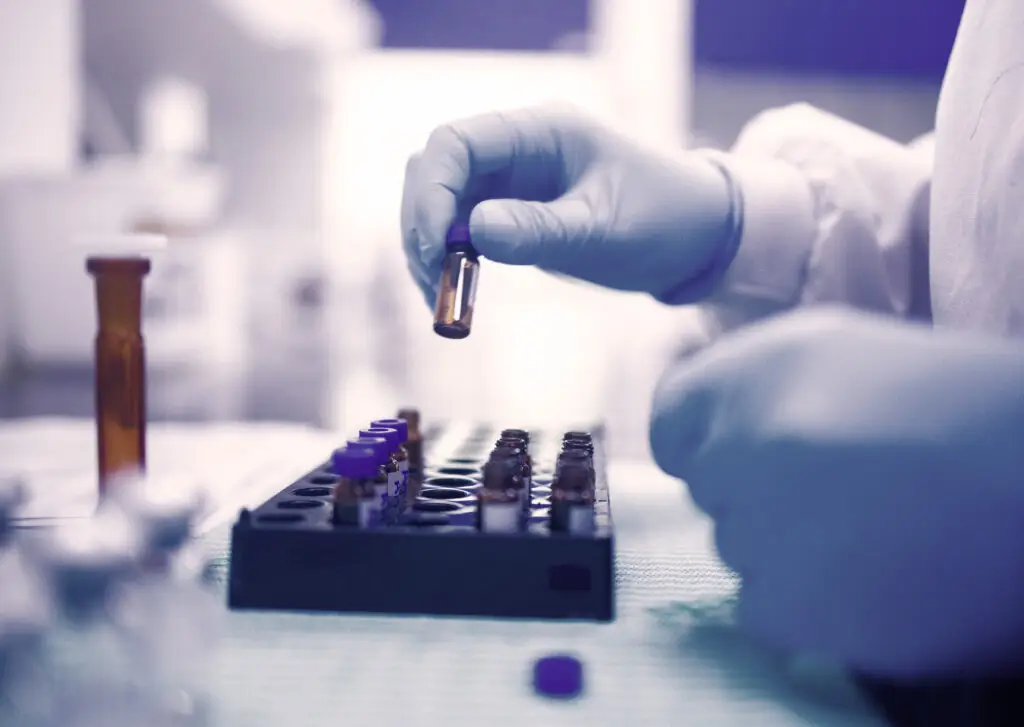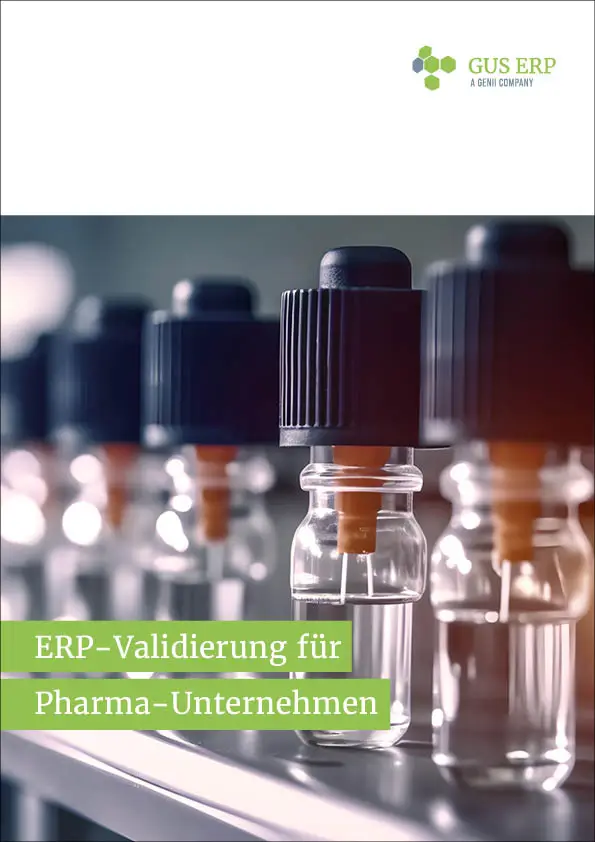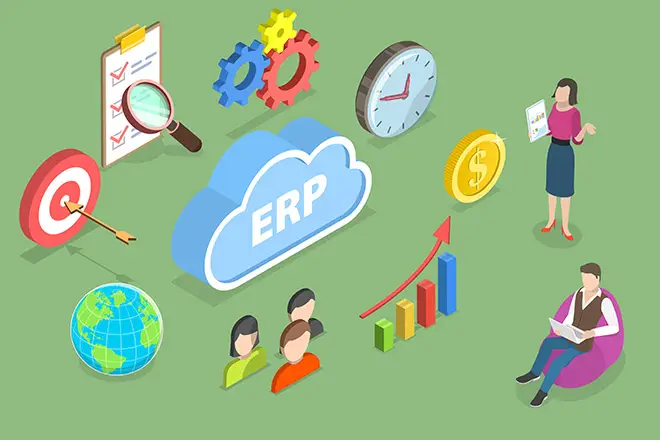ERP validation
Process-oriented systems provide security
Validated ERP implementation with GUS
Explicitly for the high demands of the pharmaceutical industry
Regulated companies in the pharmaceutical sector that want to introduce new software must check the impact of the system on patient safety, product quality and data integrity. If this is the case, the software must be introduced in such a way that a validated "computerized system" is used at the end of the project. The computerized system is always the complete system, consisting of software, hardware, infrastructure components used and connected devices as well as the specific operation and use within the specific company processes. This means that software cannot be validated without taking its use into account. It is therefore not possible to acquire validated software and use it "out of the box".
The industry-recognized best-practice guide GAMP 5 recommends using the supplier's knowledge and experience as effectively as possible when validating computer-aided systems. GUS ERP GmbH has experience with software implementations in the regulated environment and the constantly increasing requirements for validation since 1980. The GUS ERP project team will support you in implementing the necessary measures correctly.
Thanks to the ERP solution's quality management, the validation process for changes to the ERP system at Bombastus is now 100% paperless. The GUS-OS Suite is the most important tool for us to further digitalize and optimize our processes.
Maik Hanke // Bombastus-Werke AG

This is absolutely essential for validation
Validation as "the demonstration, in accordance with the principles of good manufacturing practice, that procedures, processes, equipment, materials, operations or systems actually lead to the expected results" (H.5 Glossary of the EU GMP Guide) is intended to ensure that patient safety, product quality and data integrity are not compromised. This is why GAMP 5 or the FDA's CSA initiative (Computer Software Assurance) focuses on the highly critical areas identified by risk analysis.
The process and product knowledge of the regulated company and the experience of GUS from a large number of validated implementations of ERP systems result in the appropriate scope of validation activities for the identified risk characteristics in the GAMP-5-compliant project approach of GUS. The aim is always to prove the "fit for intended use". This increases the customer's confidence in the system, as proof of suitability is provided methodically and can be traced at any time with the help of the continuously updated traceability matrix: from the requirement to the successfully completed test. Access to the created specification and verification documents is correspondingly easy, both when creating the validation report and releasing the system for productive use by the qualified person and the system owner, as well as in a subsequent audit.

Quo vadis validation
What you need to know
Validation of an ERP (Enterprise Resource Planning) system in the pharmaceutical industry is an important process to ensure that the system meets regulatory requirements and supports operations in a safe and efficient manner. Here are some key points to consider when validating an ERP system in the pharmaceutical industry:
It is not the software that is validated, but its use in your
processes, with your machines and peripheral devices and with
and by your employees.
We recommend starting with the creation of a detailed
validation plan. This plan should define
how the validation will be performed, what will be done by which
team member, and who will check
and be responsible for the results. It also includes the definition of the form
of the documentation, if it is not sufficiently regulated by the QMS with regard to
the validation of computer-aided systems
.
The GxP-relevant functions should be identified and
a comprehensive risk assessment carried out for these
in order to identify potential weaknesses in the planned
use of the ERP system and to determine the correct
risk-reducing measures. This helps to
focus validation activities on the GxP-critical processes
and ensure that the risk of critical
processes is adequately controlled.
The requirements specification describes in detail where and in which
company processes what support is required from the
ERP system. This should include all processes and
requirements that the system must fulfill.
The ERP supplier creates a functional specification based on your requirements specification, which describes how the ERP system fulfills your requirements. The reference to the GAMP software categories helps to focus the following validation activities
on your specific features.
We do this together with you: Configure the ERP system together with us according to your specified requirements. This ensures that all settings are correct and correspond to the planned use.
Create the validation documentation provided for in the validation plan in each project phase and check progress and completeness with a traceability matrix.
If deviations
or problems occur during individual activities, these must be recorded
and dealt with in such a way that the validation
can be carried out successfully. It is
important to find and document solutions,
so that the system meets the requirements,
before it goes live.
Ensure that all employees who will be using the
ERP system are properly trained
and have the necessary skills
to use it.
The right partner for validated software implementation
Pharmaceutical companies benefit from years of industry expertise
Probably no other industrial sector sets such high quality standards as companies in the process industry, in particular pharmaceuticals, food and beverages, chemicals, cosmetics, biotechnology and the associated logistics. The products of these companies have a direct impact on people's lives and therefore on their health, well-being and quality of life.
In addition, trade guidelines such as the International Food Standard (IFS) and British Retail Consortium (BRC) Global Standard-Food must be observed. These frameworks all focus on the diligence of the company and its employees.
We consider it a compliment to our own quality orientation that numerous companies in the life sciences industries have chosen our solutions as the basis for their quality-oriented business processes. We have made the quality specifications of our customers the benchmark for the quality objectives of our own business processes. This diligence is formulated in our quality charter and is therefore an obligation for every single employee - in all areas of responsibility:

We are a pharmaceutical company, so the focus is very much on compliance. compliance. For us, this means that all processes that are mapped via the ERP system must be validated. The GUS-OS Suite is a very lean, transparent system that enables us in our IT enables us to solve most of the problems ourselves.
Sönke Lorenzen // medac GmbH
- in the development and testing of software systems
- in the implementation of customer-specific specifications
- for support and system support in sales
- in the selection of system components
- in employee qualification
- in the company organization
Supplier audits
Quality management put to the test
Customers and interested parties review our quality management system in supplier audits. More and more companies, particularly from the pharmaceutical industry, are following the recommendations of the GAMP guidelines, which expressly recommend that pharmaceutical companies carry out supplier audits.
As we are constantly working on optimizing our processes, information from external audits is particularly valuable, as it is not subject to our natural "operational blindness". We have received and successfully implemented numerous suggestions for process and quality optimization from supplier audits.
ERP validation for pharmaceutical companies
Download brochure
Validation of ERP software in the pharmaceutical industry is an important process to ensure that the system meets regulatory requirements and supports operations in a safe and efficient manner.
Find out how to do this successfully in our brochure "ERP validation for pharmaceutical companies".
FAQs
Your most important questions about validation
Validation of an ERP (Enterprise Resource Planning) system in the pharmaceutical industry is an important process to ensure that the system meets regulatory requirements and supports operations in a safe and efficient manner. Here are some key points to consider when validating an ERP system in the pharmaceutical industry:
No, an ERP system cannot be purchased or rented validated per se. A validated implementation considers the entire computerized system. In addition to the software and hardware, this also includes the processes in which these are used. This means that validation can only take place by considering the entire system set up for your manufacturing process. With GUS, you get both: the optimal ERP system for validation and the support you need to successfully complete the validation process.
Such a statement can only be correct for standard functions and processes. The standard development of GUS also ensures the correct functioning of the standard functions through regulated development and QA processes. The fact that these standard functions and any project adaptations meet your functional requirements must still be ensured by our approach to the project.
A validated implementation according to GAMP is generally considered sufficient by all bodies (swissmedic, FDA, European Medicines Agency, etc.) . However, new markets usually result in new process requirements that may necessitate changes to the system. These must then be implemented in such a way that the validated status is maintained.
The QP (Qualified Person, equivalent in Germany to the competent person under the German Medicines Act) issues the approval for the productive use of the system and confirms the successful validation in the validation report.
No. In Germany, qualification is described in the Medicinal Products Act. In Switzerland, this is regulated by swissmedic. In both cases, a degree in pharmacy and several years of professional experience in pharmaceutical manufacturing are required.
Depending on the country, the relevant authorities. However, the inspection covers the entire manufacturing process. The validated introduction of the systems used is only one part of the overall audit.
Yes, for Switzerland the new forms must be used for the submission of applications from 28.01.2022. This is regulated accordingly in the Medicinal Products Licensing Ordinance (ABMV; SR 812.212.1). In addition, manufacturing and distribution authorizations in Switzerland vary to some extent at cantonal level.
EU law stipulates that all GxP-relevant data that has been assessed as critical in a risk analysis should be monitored by such a system. GUS offers this as a module integrated into the overall system.
Upcoming webinars
- free webinar
- 03.04.2025
- 10:00
- virtual
- free webinar
- 10.04.2025
- 10:00
- online
- free webinar
- 08.05.2025
- 10:00
- virtual
Newsletter - GUS Insider
Don't miss any more news and sign up for the GUS Insider. Here you will be regularly informed about all news of the GUS Group and about our software.



